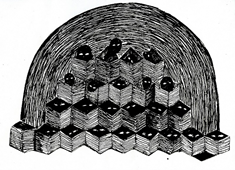Translation
Ends on
At LIT, we view all forms of expression as 'translation' -- each is a new creative foray into the unknown, an attempt to express the inexpressible. Be it a piece by someone working in English or another 'language,' the creative process includes perception, absorption, and expression. The art of translation, unlike the visual or auditory arts, requires one additional step -- moving from one language to another -- because the dream of a universal language died with Babel. So we work with translators who have gone to the other side to bring back the voices of others we so need to hear.
We're looking for the global voices that so inspire you as a translator that you're willing to (or have) spent countless hours trying to get it right. We're interested in work that responds to life experiences -- undetermined by trends -- be they now or in the past, be they in reality or in the mind, because the author feels the urgency or the necessity to do so, an urgency and a necessity that you the translator share. This spans all languages, cultures, societies, peoples, localities, religions, spiritualities, understandings, perspectives, expressions, purposes, obsessions, etc., universalities. At LIT, we're eager to read your work and share it.
- We accept poetry, fiction, auto-fiction and memoir.
- Poetry submissions should be no more than 5 poems or 10 pages.
- Prose submissions should be no longer than 25 pages.
- Translators must attain the proper rights to publish the work they are translating.
- Only submit previously unpublished work.
- Submit all written work as a .doc, .docx, or .pdf file.
- We require a cover letter for translation that includes the description of the translation and brief biographies for the author and the translator, as well as any social media handles.
- We may ask you to consider combining your translations with the artwork of a national or local artist. Give some thought to which artist's work would go well with the author you've translated.
- We accept simultaneous submissions, but let us know as soon as it’s accepted elsewhere. Please wait until you receive a response for your submission before submitting again.
- Use standard formatting: put your page number somewhere on each page. If the submission is prose heavy, please double-space. Use a standard font.
- Submissions filed by professional coordinating services will not be considered, nor will submissions we’ve already rejected in the past.
- We are unable to provide monetary compensation for accepted submissions at this time. We are a team of volunteers, and all funds that we raise go towards administrative costs of running the magazine. However, contributors selected for upcoming print editions will receive physical copies of their work.
- All submissions will be read. Please allow 90 days for a response.
